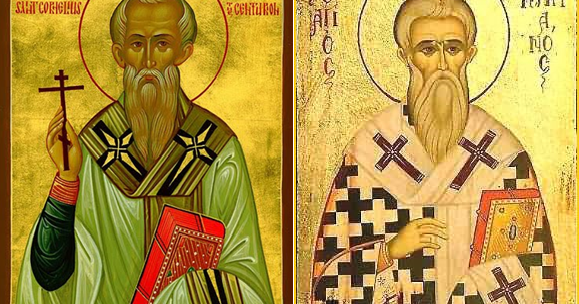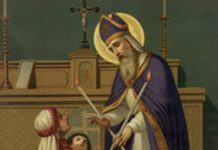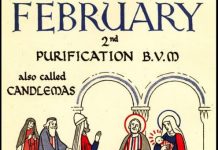Saint Cornelius was Pope for a scant two years in the third century, elected in 251, fighting against his fellow bishop Novatian, who declared himself the true Pope, thus also unwittingly making himself history’s first anti-Pope. Novatian was an early ‘hard-liner’, teaching that certain sins were so evil, to beyond the pale -especially apostasy, failing in the face of martyrdom – that one could never seek reconciliation with the Church (nor with God, one might presume).
Cornelius, on the other hand, inspired by the Holy Spirit offered by the grace of his office, realized that God’s mercy was far greater than any of our sins, and that if men must forgive each other ‘seventy times seven times’, God forgiveness is infinitely beyond this. On that score, he excommunicated Novatian, and his followers, but, we may presume, would have welcome them back in, had they too repented.
Although Cornelius helped lay the groundwork for healing this error and its schism within the Church, he was not so fortunate in placating the Roman authorities, meeting his end and gaining his final reward in the persecution under Emperor Decius, being exiled, and perishing of his hardships sometime in Anno Domini 235.
Saint Cyprian, whom we also celebrate today, was bishop of the coastal city of Carthage, in what was the Roman-governed territory in North Africa. He is famous for his theological treatises in beautiful classical Latin; he too was a foe of the Novatians, and helped fight and heal the ensuing schism. A certain amount of controversy surrounds his episcopacy, as he fled into hiding under the threat of martyrdom under the same Decian persecution. I might run also, but Cyprian’s flight was complicated by the fact that he was a bishop. He defended his action, that he would was more useful governing the scattered flock, than dead, and we can honour that decision. However, he was soon to show his underlying courage and steadfastness, for God did call him to martyrdom eventually when a subsequent persecution arose under Emperor Valerian (the same one that took Pope Sixtus II and his deacons, including Saint Lawrence). Cyprian penned his final treatise, De exhortatione martyrii, a noble exhortation to die of the faith, and he gave his final witness, losing his head to the sword on September 14, 258, what would later be the feast of the Triumph of the Cross.
We again live in an era where bishops are fighting bishops, cardinals, cardinals, laymen against them also and each other, and the language and stakes are increasing in intensity, with even the current holder of the office of Peter mentioning the spectre of schism – somewhat too blithely, one might think. I suppose there was never an era where such divisions in the Church were not the case. It seems now we are getting to the very nub of the matter of what it means to be ‘Catholic’, a follower of Christ and His Church. This requires a solid intellectual and spiritual foundation and formation, which can guide the empathy and passions, the whispers of the world in all its seductions, to see the fog of obfuscation, keeping one’s eyes focused on the truth, and the Truth, with one’s face set like flint, in those things, those truths, that are absolutely necessary and not open to compromise, like throwing our ‘incense’ in worship of all the false gods before us.
So did our Fathers of old. So must we. And the grace of Christ will not only sustain us, but give us great joy and hope in the journey. Unity in charity, and charity in unity.
Saints Cyprian and Cornelius, orate pro nobis!












